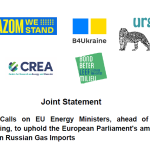As negotiations on the EU’s new electricity market enter their crucial trialogue phase, the bloc faces a litmus test for the credibility of its climate ambition. With only two trialogues left, the fate of coal subsidies is still not sealed while COP24 is approaching, writes Joanna Flisowska.
Joanna Flisowska is coal policy coordinator at Climate Action Network (CAN) Europe.
Originally published by EURACTIV on 12 November 2018.
The reform of the electricity market design, and the new rules for capacity mechanisms in particular, are entering the final stretch with the two remaining negotiation meetings gathering representatives of the European Parliament, the Council of Ministers and the European Commission. They are expected to decide whether to end subsidies to coal plants through so-called capacity mechanisms, or to continue to burn taxpayers’ money on this obsolete and harmful technology for another decade.
Align capacity mechanisms with climate goals
In order to limit funding for the most polluting power plants, the European Parliament has backed the European Commission’s proposal to exclude plants emitting more than 550 grams of CO2 per kWh from receiving capacity mechanism support from 2025. But some governments, including the Polish one, are lobbying against this much needed limitation on the use of capacity mechanisms. The current Council position proposes to delay the enforcement of this “550 rule” until 2035.
Capacity mechanisms, which are supposedly intended to ensure supply in case extra power is needed, have been wide-spread across the European Union and have become the largest single source of subsidies to power plants, adding almost €58 billion to energy bills of EU citizens. Coal power plants receive the vast majority of these massive public subsidies, despite their unprofitability and their harmful impacts on our climate, environment and health.
Avoid inefficient spending
In Bulgaria, consumers have spent €96 million since 2013 on capacity mechanisms. However, during the winter of 2017, the coal power stations that were being subsidised to provide electricity in emergency failed because the water needed to cool the plants was frozen. This came dangerously close to causing blackouts not only in Bulgaria, but across Southeast Europe.
In Poland, capacity mechanism support is designed to maintain the status quo in the country’s coal-based energy system. It is estimated that up to the year 2030 it would cost Polish taxpayers the staggering amount of even up to €14 billion. The vast majority of this sum will be used for life-extensions of existing coal plants but also for new coal.
The most stunning example in Poland is the plan to grant a 15-year long contract to subsidise the construction of a new one gigawatt hard coal plant called Ostroleka C. This comes despite the demonstrated unprofitability of the investment which is projected to cause €1.7 billion losses, despite the protest of environmental groups and despite the legal action launched against the project by the workers of one of the utilities building the power plant, who are concerned about negative impacts on their company and jobs.
EU can recover its climate leadership
Avoiding the most dangerous impacts of climate change is still possible, but only through an unprecedented shift towards a zero carbon economy. This begins with phasing out coal power plants. Nevertheless, as long as capacity mechanisms continue to subsidise coal plants it remains hard to imagine a real energy transformation. That’s why it is now high time that in the ongoing negotiations on the new European electricity market the EU corrects its faulty rules and ensures that the biggest polluters are precluded from receiving public money.
Such a positive step would contribute to elevating the EU’s climate leadership during the upcoming COP in Katowice. Should the bloc fail to agree on the obvious – to end coal subsidies – it will seriously undermine its climate credibility on the international scene.



